|
|
Welcome to my travel log! You will find here a lot more than in the travel reports, stripped from political correctness. Enjoy! 
Nov 10, 2005 07:00 PM Lake Malawi - Eagles (Malawi)
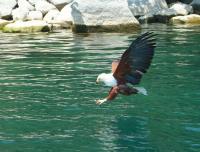 In the morning, I took a trip to an island in the Lake Malawi National Park for fish eagle spotting and lazing on the beach, as planned. I was hoping to take a few good pictures of the eagles but was not sure if I was going to see any. It was very hot and on hot days birds usually hide in shade. Frankly, I did not know what to expect.
In the morning, I took a trip to an island in the Lake Malawi National Park for fish eagle spotting and lazing on the beach, as planned. I was hoping to take a few good pictures of the eagles but was not sure if I was going to see any. It was very hot and on hot days birds usually hide in shade. Frankly, I did not know what to expect.
The four guys who took me, Gift, Soft Comment and Laniweck insisted that I was going to see not just one, but a few eagles and that I was going to take excellent pictures. Comment and Laniweck, who brought the boat, said that they had experience with organising such escapades and that I should not worry at all. Well, I remained very sceptical, because they were only fifteen or sixteen years old.
The guys had a trick with the fish eagles. They bought small fish and after whistling at the birds they tossed the fish into the lake. The eagles then took off from the tree branches and went for the fish. The birds came quite close but it was still tricky to photograph them because they were very fast! Fortunately, about six eagles came, so I had plenty of opportunities to take my pictures. I actually persuaded the guys to get some more of the little fish and keep trying with the eagles, so I was absolutely sure I had a few decent shots. I quickly reviewed them in the camera and then decided to give the birds a break. I guess it was time fo rme to eat some fish.
Gift and Soft grilled a large catfish for my lunch directly on the beach. I was a little concerned about the hygiene, since the utensils were being cleaned with the sand and ash and washed in the lake. Perhaps, I should have not seen how they prepared the food.
In the meantime, we chatted about girlfriends and AIDS, which was a massive problem in Malawi. About half of the population was infected with HIV.
One of the guys told me about the ABC campaign and confessed that he had sex at the age of sixteen but then stopped and was sticking to the A principle. He therefore had no girlfriend anymore.
The ABC campaign stands for: A - abstinence, B - being faithful, C - condom.
At the various stages of this campaign’s life-cycle, the focus kept shifting from C to B, to A. The emphasis of the ABC campaign was also inconsistent. Few people were aware that all three ABC had to be in place for the AIDS problem to decline. I heard that wives of certain country leaders kept saying that only the B principle was important (and eventually the A), and therefore the distribution of condoms was stopped!
I told the guys that this was rubbish and that all three principles were important. They mentioned that the African culture did not always agree with the use of condoms. They said that many women insisted on the skin-to-skin principle pretending the problem of AIDS did not exist or was not going to affect them.
We also spoke about their school. The boys told me that the fee for the full three term year of secondary school was USD 750. It sounded excessive to me. How would anyone in poor Malawi be able to pay this much?
The lads were actually hoping that I could sponsor them, but I told them that it was too expensive for me, and I regretted that. However, I told them that they should send me their grades and I could reconsider. They all claimed to be very good at everything.
Later, I found that they were not telling me the truth. Their quote was three times the actual cost of the school fees. I have to say that I did not like that. They did not know that I found the truth. So, I decided to leave it.
Just after 2 p.m. my eagles trip was over. Before I went to the Fat Monkeys Bar to snooze and wait for my transport, I walked along the lake shore to the next village. It was the first time I walked east of the bar. I was promptly swarmed by kids who all wanted to touch me. It was a great experience, but some of the kids had hands soiled with unidentified and often sticky substances. I tried to carry on walking with a dozen brats attached to my arms.
I thought I was going to be safer at the bar, so went back quickly.
The 4 p.m. came eventually and I was still waiting for my transport. I kept waiting and waiting, and at about 6 p.m. I started speculating about fixing an alternative way of getting to the Lilongwe Airport.
At the bar, I was chatting to a local playboy Anton, an expatriate guy named Aubry, who ran two lodges at Cap Maclear and two holidaying girls from London. Aubry said that if l was stuck, I should call him and he would sort me out by organising a speedboat transfer for me. So did Anton.
By 9 p.m. there was no sign of the car so I took a room at the Fat Monkeys again, called Aubry and went to bed. Uh, and l also made sure I had backup - Anton, who also had a speedboat.
It was funny that Anton was very competitive and said that I should definitely go with him, because Aubry had a reputation of talking and talking much and doing little. Anton was however very expensive, and I decided to put some trust into Aubry. The instructions I was given were to wait until 7 a.m. and make contact again. I made sure that Aubry understood well that I needed to be at the airport by noon.
At about 9.30 p.m. the same evening, the Rastafarian guy came and said he was ready to go. I was already in bed. I told him that I was no longer going with him but was taking a speedboat in the morning instead. He tried to fool me that I was not going to make it because of the strong winds and rough water. I basically told him to go away.
This, of course, was not the first time in Africa that someone did not keep their word. So, I was mentally prepared for such turn of events. However, I do not think the Rastafarian guy was prepared for my refusal, though. I have to say that I did not care much at all. I was not prepared to travel at the back of a pickup truck on a very rough road in the middle of the night. Now, situations like that are a good illustration why no-one should ever make advance payments or deposits.
|
Nov 09, 2005 07:00 PM Songa on Lake Malawi (Malawi)
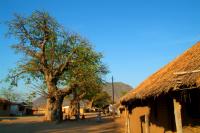 One of the three Cape Maclear fishing villages, Songa, where Fat Monkeys were actually located, were quite picturesque in the late afternoon. There were a few interesting houses and a short alley of giant baobabs or rather a large square, where a shop and a disco bar were located. I have to say that this could have easily been the most pleasant spot of my trip so far.
One of the three Cape Maclear fishing villages, Songa, where Fat Monkeys were actually located, were quite picturesque in the late afternoon. There were a few interesting houses and a short alley of giant baobabs or rather a large square, where a shop and a disco bar were located. I have to say that this could have easily been the most pleasant spot of my trip so far.
The houses were built of mud brick and painted in light brown or white. Many had small fences made of reed. Women were snoozing under the giant trees or manufacturing something for their households. Kids were playing quietly in the shade of the baobabs and a few guys chatted at the steps of the little shop, sipping local beer from large brown bottles.
The late afternoon sun made the trees cast long shadows and no-one had to hide in their houses anymore. They took their everyday life to this little square. I was surprised to find it like that at the lake. I thought there was only going to be the beach and a few huts.
Gift, who took me to the spot, insisted we took a slight detour around the baobabs not too clash with the women. He said something that young boys were required to keep distance from women and kids. I am not sure if he explained it to me correctly.
|
Nov 09, 2005 07:00 PM Cape Maclear (Malawi)
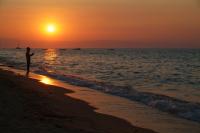 When I came to Monkey Bay, I could not believe it was so uninspiring and therefore I quickly made a decision to move to Cape Maclear instead and stay there on the beach, at one of the campsites.
When I came to Monkey Bay, I could not believe it was so uninspiring and therefore I quickly made a decision to move to Cape Maclear instead and stay there on the beach, at one of the campsites.
There were a few accommodation options in Cape Maclear. Although I thought of the Emmanuel's first, I saw the Fat Monkey was better advertised and I hoped to meet other travellers there, so I changed my mind and went there.
It was a good move as the restaurant was decent and there were in fact a few travellers around. Some of them stayed there and some of them kept coming just for the bar and restaurant.
As soon as I checked in, I had my brunch (fish with rice) in the restaurant and went to see the beach and the famous lake. I thought there would be some palm trees there but they were all gone, apparently turned into charcoal.
The beach was fairly clean despite all the usual fishing village activities - fishing, netting, dish washing and fish cleaning, and soap and foam bathing. I was therefore impressed that the beach was not smelly or dirty. One could safely relax on the sand, take a swim in the lake or fry under the sun.
The locals must have understood that although this was their beach, and they could do whatever they wanted on it, the tourists, who come there, like the beach clean.
Within 25 minutes of walking on the beach, I met an 18 years old artist-turned-guide or guide-turned-artist. His name was Gift, which I found unusual but I could most definitely understand the reasons why his parents gave him that name. He was the first-born son.
We spoke a little about my travel plans and what was left on my itinerary. He mentioned that his friend's friend was going to Senga Bay (north, along the lake) the next day and that I could ask if he could take me.
So, I spoke to Gift's friend, Soft (again unusual, and again I could understand potential reasons but I believe it could be quite unfortunate...) who took me to his friend. His friend was a Rastafarian married to an American girl, whose friend was going to the airport in Lilongwe, so I could tag along.
As it turned out, despite the fact that I was hitching, I still had to pay for the ride, obviously. This is how this worked (works, and will work for a while) in Africa and despite my strong feeling of disagreement with such practice, I shook hands on it. After negotiating the price first, of course.
He asked me for an advanced payment, so he could buy petrol. I thought this was way too much and I strongly refused. I had to be rather careful not to get offended with such an argument but remained cool. I told the guy that he was very funny asking me to buy his petrol, because he was going to Senga Bay anyway, so he had to get petrol for his trip even had he never met me! Surprisingly he did not insisted at all and we shook hands again.
Actually none of the guys I met in Malawi insisted much whenever I was disagreeing or refusing to buy anything. Only Gift kept pressing a little trying a number of arguments, including dead parents and sick grandmother. I have been through too many places around the world to be softened by stories like those. They all could be true, but sometimes they are definitely not.
My transport was not leaving before 4 p.m. next day, so I thought I could explore the area a little more in the morning and even in the early afternoon.
I decided to consider a boat trip to the nearby islands and to see the famous fish eagle. Gift and Soft became very excited about my thoughts and promised me a fantastic trip with splendid photographic opportunities if I chose to go with them. Obviously I had to ask a few screening questions and agree to a price before shaking on it. Finally, I did and told the boys to pick me up at Fat Monkeys at 9 a.m. They also asked me for an advance payment but I had to decline that request, too.
I lingered on the beach until the end of the sunset and the night fell ‘Africanly’ rapidly. After necking two Cokes and a Sprite at the Fat Monkeys Bar, I made an effort to step back on the beach, which was five yards away. I looked up to the sky and marvelled at its clarity.
The moon appeared very close. It was so clear and bright that I could actually take a picture of it without a struggle. My camera picked it up (with F13 1/90 sec ISO400) like it was a cluster of baobabs in broad daylight two hundred yards away!
|
Nov 08, 2005 07:00 PM Blantyre (Malawi)
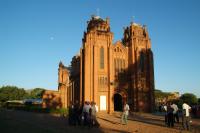 Descriptions of Blantyre provided in the travel literature did not accurately illustrate the character of the place. Yes, it could be attractively situated among green hills but hardly any of them are visible from the town itself. The smell of the eucalyptus trees was massively exaggerated as well. The colonial district with the 19th century church was in fact the most attractive spot of the town but was not even remotely picturesque.
Descriptions of Blantyre provided in the travel literature did not accurately illustrate the character of the place. Yes, it could be attractively situated among green hills but hardly any of them are visible from the town itself. The smell of the eucalyptus trees was massively exaggerated as well. The colonial district with the 19th century church was in fact the most attractive spot of the town but was not even remotely picturesque.
I was a little disappointed and thought that I should have never read those descriptions. I knew I was smarter than this, not to pay too much attention to someone else’s opinions of places. Yet I think this time round I must have fallen in this trap. I have a different perception of places, and although reading about the places I plan to visit is always important, I know I should be more than sceptical about any descriptions provided. Well, one learns everyday...
Blantyre was a group of 20-30 year-old concrete buildings of varied height located along two main streets running parallel and roughly from west to east, and linked by a few short streets every few hundred yards. There were attractive green suburbs albeit to contemplate them was hard because everywhere there were alleys between private residences’ three meter-tall concrete walls.
The town was clean and appeared to be well organised, unlike many other African towns of similar size. With exception of public regional and national transport, which was unsurprisingly messy. I did expect that from a less developed African country.
As I mentioned before, for a number of years, Malawi had been considered one of the friendliest countries of Africa. It was dubbed 'Africa for beginners'. Violence had been unheard of and people were warm and genuine. As I found out from the locals and other travellers, nowadays, the situation did not look so pretty. A number of warnings had been posted of not wandering around towns during the hours of darkness and certain areas of the capital Lilongwe were considered unsafe at any time of day or night.
It is very sad when warning like those begin to appear in the general broadcast, because it does not serve the society at all. It results in the decline in tourism and money stops flowing into the country, and effectively to the people. For Malawi, which would like to catch up little bit economically with its neighbours, this becomes a problem. And who would like to have a reputation of unsafe country, anyway?
In Blantyre I spent most of the morning in the lousy immigration office. The officials there must be orgasmically happy with their dream jobs. The office was supposed to open at 7.30 a.m. but by 8 o'clock there was no-one there. Officials wandered purposelessly about the building and pretended they were doing something.
The amount of paper dumped on the floor in heaps everywhere made an interesting (for a lack of better word) sight, and a logistical barrier for passing people. The heaps were from several inches to two yards tall (I say yards and not feet to stimulate imagination). I have never seen a worse mess in my life, so I guess I was glad I had seen it. I am quite sure this must have also been heaven for mice and rats.
Eventually, at about 9 a.m. someone came and asked me to fill out all the same paperwork that I had done in London before I came to Africa. When I finished and the officer asked me to sit down and wait, I was livid! How long was it supposed to take to stamp a page in my passport?! I already lost a day in my itinerary because of this nonsense. By the way, it appeared that he also forgotten to tell me that instead of waiting I could have climbed the stairs to the cashier and paid the visa fee.
In the end I had to give them a pen to complete the procedure. This part amused me, actually.
When I finally had a visa stamp in my passport, I had to make sure I could proceed with my itinerary, somehow. Of course, that meant to secure transport towards Lake Malawi, which was not going to be easy.
The night before, I went to the town’s bus terminal, only to find out that the only bus towards Lake Malawi was leaving at 9.30 a.m. Had I not needed to deal with the immigration, it would have been almost perfect for me. Instead, I felt like I was stranded in Blantyre with little means to get out and continue my trip. I was actually a little worried I was not going to see Lake Malawi at all.
I asked a few taxi drivers how much they would charge me to Monkey Bay at the lake, and when I heard the reply, I was not sure if I could justify the expense. They wanted 150 US dollars. However, it took me less than ten minutes to invoke the dangerous concept of ‘never coming back’, which means that I should see as much as possible of the country, and if necessary, pay extra.
It is a dangerous concept because it makes me spend more than a backpacker in a backpackers paradise (Africa) would consider decent or sane. Well, why a person like me, who invented backpacking with a splurge, should care about it?
Oh, backpacking with a splurge means staying cheap and cheerfully with a budget conscience people (often in a tent, sometimes under the stars) and eat well. Plus, spend more on more extravagant activities like a helicopter ride, hire a taxi or take an airplane in order to speed up the transfer from A to B.
|
Nov 07, 2005 07:00 PM Lusaka (Zambia)
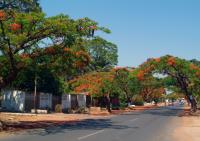 I remember that I struggled with the decision what to do in Lusaka when I was planning my trip. I could not find anything too flattering about the city and there were definitely no sights that came highly recommended. So, what I planned was to just arrive, snooze to my next flight, and see what happens in the meantime.
I remember that I struggled with the decision what to do in Lusaka when I was planning my trip. I could not find anything too flattering about the city and there were definitely no sights that came highly recommended. So, what I planned was to just arrive, snooze to my next flight, and see what happens in the meantime.
I arrived in Lusaka at sunset. From a distance a few concrete skyscrapers appeared, which indicated that back in the 1970's the town aspired to become a modern metropolis.
I took my dinner at the Chachacha Backpackers Lodge and had a chat with the cook who happily grilled me a juicy, if a little bit too chewy, T-bone steak, for a price, of course. He, and another local told me that Zambia was fortunate to be multi-tribal and poli-ethnical as this meant no tension and no wars.
I did check it later on, and in fact, there were no wars or major problems within the society linked to ethnic origin, religion or nationality. The society was obviously mature and everyone, although proud to be part of their tribe or ethnic group, they knew they were all Zambians too.
Later, I went to the Chachacha Backpackers bar, only to find a couple drinking tea ,completely uninterested in talking to anybody, and a young bartender, Charlie, who said he could show me some of the going-out places of Lusaka. I hesitated only for a few minutes and was ready to hit the town. What the hell?!
I was taken to the Northmead area, which boasted a few lively places to boogie and drink. And some of them were open 24 hours a day.
I partied at the Alpha Bar, mainly. The place was already quite full at 10:45 p.m. but at midnight it was packed. I was not surprised because the fairly lousy dj's put some quality tunes. I also loved a few local tracks while the crowd was going mad. I am saying that the dj was lousy, because he did not know when to stop talking.
The locals did dominate in the venue but I spotted about seven other white people mingling with the crowd. It felt good and very comfortable there and I was very happy with myself that I actually decided to go out. It was Saturday night, and I certainly it was a must.
About 15 minutes into the party and a girl named Linda was hoping to shag me. She helplessly lingered around me and Charlie for about three hours inviting me continuously to dance. She was getting increasingly inebriated and could not get over the fact that I was sticking to soft drinks. Eventually she actually asked me to copulate with her and when I told her that it was not going to happen and that I had a girlfriend she took off with the speed of light. I felt sorry for her. She had wasted three hours of Saturday night fever.
Later, I met Brian, Charlie's friend with whom we discussed the safety in Zambia. First Brian said that Zambians were friendly and that there was no violence in the streets. However, when I suggested that it would be pleasant to walk back to the Backpackers (it was a few hundred yards away), both Brian and Charlie said it was not safe. I found it rather contradicting.
We debated that for about an hour, which I thought was highly entertaining and interesting.
I had a peek at two other bars in the area, one of which was a night ‘simply everything’ shop with a few tables in the main hall. Music was blasting from large speakers colliding with the sounds coming from the clubs nearby. As I was running low on the local currency, I used this shop to change some US dollars. Twice! It was very convenient.
The other bar was a simple dark room with a few stools. Nothing special, but up to standard, clean and safe.
It was very easy to find a taxi that night. Actually, taxis in Africa are like the big, wild cats. They spot their prey long before the prey realises it is being hunted. The taxis hoovered around all the bars and the potential customers were spoiled for choice. I was in bed a few minutes before 2 a.m.
When the sun came in the morning, I could not get up at the time I thought I should. I wanted to see bits of Lusaka before I left the country, and was planning to be up on my feet at 7 o’clock. It was more like 9 o’clock eventually. Naturally, it did not matter. I was on holiday.
When I finally made my way to the main street, Cairo Road, I had to conclude that the downtown Lusaka was very ugly. There was absolutely no character to it and the only positive feature was a tree-shaded pedestrian area between four lanes of central city traffic.
There were no historical buildings at all and the grey concrete highrise buildings from the 1970’s looked rather grotesque. I had absolutely no idea, what I should photograph of Lusaka, so the picture could then be presented in this story. There was absolutely nothing in the downtown area, so I snapped the road from the centre to my backpackers lodge. It was a nice street with ‘Christmas Plant’ trees planted at each side of it - see picture above.
Clifford, the taxi driver whom I met before, did not come to pick me up at the lodge on time to take me to the airport, despite his determination to make me agree that he would drive me. So, I took a random taxi, driver of which was ecstatic to take me for such a long ride. He must have been very happy, he was standing outside the Backpackers lodge hoping for a job.
|
Nov 06, 2005 07:00 PM Livingstone (Zambia)
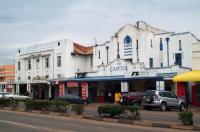 The town of Livingstone looked like a one street place, although at night many bars open and both locals and tourists (who abandoned the Zimbabwean side) flocked there, and the former chased the latter. In particular, there was a disco club called Step Rite, which was a meatmarket where white guys usually exposed themselves unaware to frequent and insistent marriage proposals from the local females. No rings though!
The town of Livingstone looked like a one street place, although at night many bars open and both locals and tourists (who abandoned the Zimbabwean side) flocked there, and the former chased the latter. In particular, there was a disco club called Step Rite, which was a meatmarket where white guys usually exposed themselves unaware to frequent and insistent marriage proposals from the local females. No rings though!
I ate at the adjacent Rite Pub & Grill, which served a wide variety of food in great portions, including peri-peri chicken, steaks, fish & chips, pasta, pizza, and burgers. All very reasonably priced (steak was ZMK 40,000 = USD10, half chicken 31,000).
I took a stroll in Livingstone and I cannot remember anything that stroke me much. The main street was interesting with a few colonial, and real-African looking buildings, but there was nothing exceptional about the town. That was good because I was not expecting much anyway. Is it harsh to say that?
Since there were no falls at the Zambian side, I decided to take a helicopter ride to take some aerial pictures. I thought that it should be exciting. However, it was only available the next day, so I chilled for the evening and went out in the town. I went to see a few bars and restaurants and thought that the backpackers place should be lively enough. I was mistaken. The lodge was deserted. Everyone was asleep.
It was a shock for me! Backpackers places are usually exceptionally lively, particularly those in Africa. Not this one!
The Jollyboys Backpackers (the gayest name ever, I think) organised a few good escapades around Zambia, and I started wondering whether I should have stayed longer there and have done some of them. Then again, I saw all the African animals in Namibia before and I was only looking for some spectacular scenery this time.
When the morning came, the sky looked prettier with frequent sunny spells. I got up and went to the Victoria Falls from the Zambian side to take some more pictures. The sights over the falls from there were much better as there was significantly less vegetation obscuring the views. As the entire Eastern Cataract, The Rainbow Fall and The Horseshoe Fall were dry, one could admire the escarpment but it was easy to imagine how superb the falls must look when full with water.
I have been told that even those falls gave so much spray when full (between February and April) that it was hard to see anything. So, I was no longer sure if I should be unhappy or rather happy with the timing I came to see them.
Then I went on a helicopter ride over the falls. It was exhilarating! It was my first time in a light helicopter and I loved every rotation of it!
The views over the river and the falls were extraordinary. The flight was a thrilling fifteen minutes but the pilot took some super approaches towards the escarpments and the river that this whole fascinating experience became totally unforgettable.
The pilot flew the machines energetically, like in a racing scene of an action film. The nose of hte helicopter dropped down several times showing the river, the hippos, the bush and the falls from an interesting perspective. Obviously, only from the air one could fully appreciate the wonder of the falls.
I was very glad that I decided to do it. It cost USD 85 but it was so worth it! Next time I will be travelling in the vicinity, say Angola, I will make sure it is in January or February when the falls would have gained some power and I will do it again.
Then, if it was still possible, I would also visit the Livingstone Island for picnic. The island is located on the river, between two of the falls, directly on the edge of the main escarpment, from which the river plunges down. I think this island is a private property and such picnic has to be arranged with the proprietors at - reservations@tongabezi.com
Although I thought I could have stayed a bit longer in the area, I was thrilled that I was going further, to see some more of the African continent.
The bus from Livingstone to Lusaka (with CR Holdings) departed half an hour late but it was very comfortable. It provided soft seats with plenty of legroom and effective air conditioning. The trip took five hours but it did not feel like it all. Weather got much better as I moved north. The driver tuned some varied African music. Some of it was good and some quite bad. When the Zambian radio was on the music was much better and when the driver put his own tapes it was dreadful. It did not matter because then I put on my iPod and listened to my music.
|
Nov 05, 2005 07:00 PM Victoria Falls (Zimbabwe)
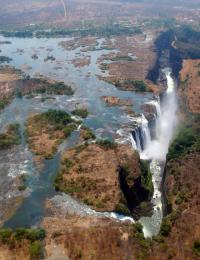 I had a bad luck or bad timing with the Victoria Falls. Although Lonely Planet guidebook claimed that the falls were at their best viewing in September - November, the falls when I visited (mid November) were rather small. I was disappointed - the waters of the river Zambezi were very low and only about twenty percent of the fall was falling. The rest of it was dry.
I had a bad luck or bad timing with the Victoria Falls. Although Lonely Planet guidebook claimed that the falls were at their best viewing in September - November, the falls when I visited (mid November) were rather small. I was disappointed - the waters of the river Zambezi were very low and only about twenty percent of the fall was falling. The rest of it was dry.
Low water there was, yet the falls' spray drenched me completely. The ‘main fall’ was quite full and the thunder of falling water was accompanied by a thick mist or spray. At certain point it was actually raining.
It was rather hard to take a good picture of the falls in such circumstances. The spray from the falls was so intense it created quite a heavy rain and one could not pull out the camera unless of course one brought a diving camera.
It all depended on the location. There could have been a few very good spots around the falls for pictures taking, however, since the number of tourists had plummeted in the last three years, the park maintenance was much worse than it used to be and overgrown vegetation obscured the view.
As I said I came at time when the falls were mere trickle compared with what they are at the beginning of the dry season when the Zambezi is full. So, a large portion of the falls including the famous and spectacular Horseshoe Fall disappeared completely. I have to say that I was very disappointed with that. I had two opportunities in the past, when I could see the waterfalls in their full glory (December 2004 and June 2005) and I thought I could come any other time to see them. I was wrong. Timing with the Victoria Falls is an important factor.
In addition to all that weather was not good either. There was overcast, the cloud was hanging low and light rain kept on coming on an irregular basis. The sky was grey, so it was hard to predict which of the grey clouds were going to produce rain and which not. Pictures were coming out dull.
With my head down, I decided to make my way to Zambia and... I missed my transport.
I thought I had some time to kill, so I sat down at the park’s headquarters and started reviewing the pictures I took. I wanted to make sure that before I cross over to Zambia, I had at least some shots I could keep. I also wanted to have a drink since I was quite dehydrated after that long train journey, but the drink machines were faulty and the guy from the bar never came. When I eventually thought I should be making my way to the border, which was several hundred yards away, and where my transport had been waiting for me, I was actually five minutes late already.
Fortunately, I was able to explain tot he immigration officer that I should be exempted from Zambian visa as my accommodation agent should have put me on their manifest. I said those exact words to the officer and I had absolutely no idea what I was saying. Well, it worked fine. I did not need to say more than that.
Within three minutes I was in a taxi taking me to Livingstone.
|
Nov 04, 2005 07:00 PM Bulawayo - Victoria Falls on the train (Zimbabwe)
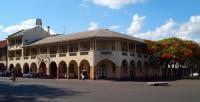 I decided to have a drink at the station before I was to board. I noticed that many people ate a white substance of which they made small balls and dipped them in sauce. All ate with hands only! I think this substance was called sadza and was made from maize. After trying it, I can state that I positively and totally hate it!
I decided to have a drink at the station before I was to board. I noticed that many people ate a white substance of which they made small balls and dipped them in sauce. All ate with hands only! I think this substance was called sadza and was made from maize. After trying it, I can state that I positively and totally hate it!
I sat at the station bar for almost three hours, as the train schedule was changed and I did not know about it. My ticket did not indicate the train departure time. So, I bought and drank a lot of water and coke. One of the waiters eventually started talking to me after all those many drinks. It appeared that he had never seen Victoria Falls. I could hardly believe it since this natural wonder was so close.
Well, I gave him USD 20 and told him to go. I made him promise that he would not spend it on anything else but the train ticket to Victoria Falls. I could not believe that I did that, and neither could he. So, when the time was right he took my bag, walked me to the train and made sure I was seating in the right seat. I am not sure why I am telling you this, but it kind of makes me feel good about me.
On the train I was sitting with two Zim guys one of whom lived in Capetown, South Africa. They told me that due to Robert Mugabe's demolition of townships the towns were very quiet. They could not recognise their own country.
We spoke a lot about African hardships. They are linked to and result from ancient family oriented thinking and a lack of imaginative looking into the future. Parents make far too many kids, who are supposed to make the family stronger however the effect is terribly opposite. The kids have to share family wealth and the family cannot afford their education. With no education the kids cannot get good employment and there are simply too many of them to share father's farm. In consequence they keep drawing from the family rather than providing support. Many people realise that now, and yet still make too many children, because the elders expect that of them.
Getting married too soon, although for fairly good reasons, is another problem. Young guys are told that because they like sex so much they should grab a girl early and marry her to avoid having to sleep with many girls risking the HIV infection. It appears to be a good reason, however what ever happened to love and ensuring appropriate foundations for a family? How about social and psychological readiness? How about financials?
The guys also confessed to me that they did not like using condoms. They claimed they were too strong (I guess they might have meant the size of their manhoods) which caused the condoms to break or split. I argued that this had little to do with “the strength” and that they should be using good quality condoms. I showed them mine and they eventually agreed with me, but said that they had lost confidence in condoms anyway.
We continued our strange discussions until the wee hours of the morning. In the meantime, the guys bribed the personnel from the restaurant carriage to sell them some food, since officially nothing was available. There was a restaurant car to make a good impression, but no food or drink was served.
The train was remarkably punctual and by 8.30 am I was at the gates of the Victoria Falls National Park. I was told that trains in Zimbabwe were notoriously late and it was not uncommon for the train to arrive at 10 am or even later. I therefore declared myself lucky. Only for about fifteen minutes, though!
|
Nov 04, 2005 07:00 PM Bulawayo (Zimbabwe)
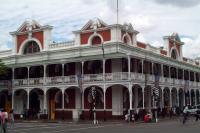 I had to get up very early to catch my bus to Bulawayo. I hate to say it, but I was not amused that I was faced with a challenge to find the right spot on the Masvingo streets to catch the correct bus so early in the morning. People kept giving me contradictory directions and I was getting increasingly confused with every half an hour passing the time at which the bus was supposed to leave.
I had to get up very early to catch my bus to Bulawayo. I hate to say it, but I was not amused that I was faced with a challenge to find the right spot on the Masvingo streets to catch the correct bus so early in the morning. People kept giving me contradictory directions and I was getting increasingly confused with every half an hour passing the time at which the bus was supposed to leave.
I was standing at one of the crossroads hoping that it was the right place to be. The dawn broke in revealing that there were many people hunting buses in all sorts of directions. Many buses came and I was under the impression that they were all going in the wrong directions.
I later realised that they were all going to the same place - hyper-guarded state petrol station. They were filling up before setting off on their routes. Gosh, that was misleading!
I eventually left two hours behind the alleged schedule. The bus looked completely packed from the outside, but there were surprisingly many seats available. I climbed on the bus. I was disturbed by the fact that people did not give a toss, that I was trying to move along the bus, to the available seats at the back, and everyone was sitting still, making sure it was impossibly difficult for me to move with all my luggage in both hands. No-one cleared the aisle and I had to push and ‘elbow’ my way through!
It was horrible! I suspected that they might have been taking a great, if pervasive, pleasure of watching me struggle there in this very narrow aisle, while the bus already on its way kept taking corners like it was a race car.
Actually, I think the not-letting-people-through behaviour is not unique to Zimbabwe. It is an African thing. I remember that it was typical in any crowded place in Africa, that people would not move out of the way, when someone tried passing through, whether it was on a market or in the street.
As the bus rolled into Bulawayo, I was again unsure where to get off. When it stopped at the Townhall, I asked a young man if it was a good stop for the train station and he replied that he did not know. I asked two other people and they did not know either.
So I made a mistake and stayed on the bus to the next stop, which was in the suburbs, and had to hike back to town.
I had no idea where I was exactly so I asked a few people for the train station and no-one knew! I could not believe this. I even started thinking that this might not be Bulawayo, at all. Well, I ended up taking a taxi, which set me back by ZWD 115,000. And luckily I was in Bulawayo.
I got to the station before noon and fortunately first class sleepers were still available for that night. However I did not have enough Zim dollars and they would not accept payment in US dollars (sic!) so I had to drag myself with my entire luggage back to town to change money. Can you imagine where my thoughts about how my day was going so far were? I was however pleased that the railways’ lady let me make the reservation and pay later. She did ask me if I was going to pay that day...
I found a bank a couple miles away, and then I hiked back to the station. The setback was that I had to queue twice to the booking desk, and the second time, the queue was only just three times as long as the first one I attended. Typical and totally expected!
I have to say that queueing was very well organised in Zimbabwe, compared with any other African country. There was always one single line and people did not lean on one another. Also, plenty of space was left open between the counter and the queue. Whereas in other African states, counters were swarmed by people, who had no problem sticking their noses (and eyes) into your wallet as you made your payments, or worse, received money in a bank.
Bulawayo was a lovely town. It boasted fine examples of colonial architecture dotted around the centre along wide and sunny avenues. Shops and western-style restaurants, like Nandoo's for example, brought a breeze of civilisation in this economically troubled and politically discredited country. Yet, I was the only white person on the streets and I am sure no-one noticed that as they all were checking out my big, black and sexy camera. A girl stopped me to ask if I was a photo reporter because she would like to be one. I said I was not but I let her touch my camera. She was so thrilled that her knees started shaking. I wish I was making the same impact on girls as my camera was.
For lunch I stopped at the Cape To Cairo - a colonial style restaurant serving a good choice of dishes in an immaculately kept dinning room, whose walls were decorated with stuffed game heads, including black buffalo, kudu and gnu (wildebeest), and with sepia photographs of Zimbabwean life in the beginning of the twentieth century.
The bar was astonishingly well stocked with all types of booze. I was not drinking though. The restaurant did not accept credit cards but it would accept cheques or foreign currency at a very good rate (1US = 80,000 ZWD), 33 percent better than the banks. The food was fine. I had a steak for 320,000 dollars, (I paid 80,000 extra for pepper sauce) but it was rather flat pieces of beef. I obviously expected a good thick Argentinean or Texan juicy and considerable in size slice slab of meat. Well, anyway, the main waiter called me Baba, which means father. I could not think of a single reason why he did that.
There was also a little girl in the restaurant playing between empty tables. I think she was the owner’s daughter. She spotted me after a while and walked towards my seat. We exchanged a few words, but then she was very upset when I was leaving. I just could not tell her that I was actually not coming back and I did not want to lie, so I used my ever more favourite phrase ‘maybe’.
As my camera, heavy and sexy, hung from my neck tried competitively to keep balance against my backpack on my back as I was making my way back to the train station, a few people asked me to take pictures of them. They were all quite amazed to see the result on the small LCD screen. I would expect it would not be such a sensation in quite developed Zimbabwe. Well...
|
Nov 03, 2005 07:00 PM Great Zimbabwe (Zimbabwe)
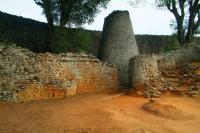 The national monument of the Great Zimbabwe was the very reason why I made an effort to come to Masvingo. It is an historical place from which the entire country took name, after it became independent of Britain and shook off its colonial name of Rhodesia.
The national monument of the Great Zimbabwe was the very reason why I made an effort to come to Masvingo. It is an historical place from which the entire country took name, after it became independent of Britain and shook off its colonial name of Rhodesia.
It was an interesting place with carefully erected stone structures linked to local royalty from 13th century. This is what I found in a generally available literature. However, the guide at the site claimed that the place was a few thousand years old! I was not sure if he just wanted to exaggerate and impress me or simply knew so little about it.
At the Great Enclosure, a royal compound surrounded by an 11 meter high 5 meter thick stone wall, there was a 10 meter-high Conical Tower located in a supposedly boys initiation room. This tower was one of the symbols of Zimbabwe, and a symbol (or a feature) of one of the local political parties.
I was told that the boys, as they reached pubity, they were prepared for adult life, which involved circumcision. At that age?! I quickly commented that it sounded strange to me because they were not Jewish. My guide riposted that it was also their tradition. I asked him if he was circumcised and he said he was not. I then started joking with him that the tower could have also represented a penis.
As I rushed to the girls initiation area and was shown a raised 'teacher' stage who would explain 'things' and was told about phallic sculptures found there, I could not resist suggesting what those artificial penises could have been used as part of girls initiation process. I specifically left certain things unsaid to stimulate imagination of my guide, who nearly pissed himself giggling and trying not to show it too much.
I think I liked the Great Zimbabwe. It is a significant site of Africa, representing probably an example of a sophisticated social structure of people who built it. Apart from the Mediterranean Africa, west Africa, Sudan and Ethiopia, there are very few places of comparable architectural complexity on the continent, dating from the same period.
|
Page:
 79 80 81 82 83 84 85 86 87 88 89
79 80 81 82 83 84 85 86 87 88 89

|
|
|
